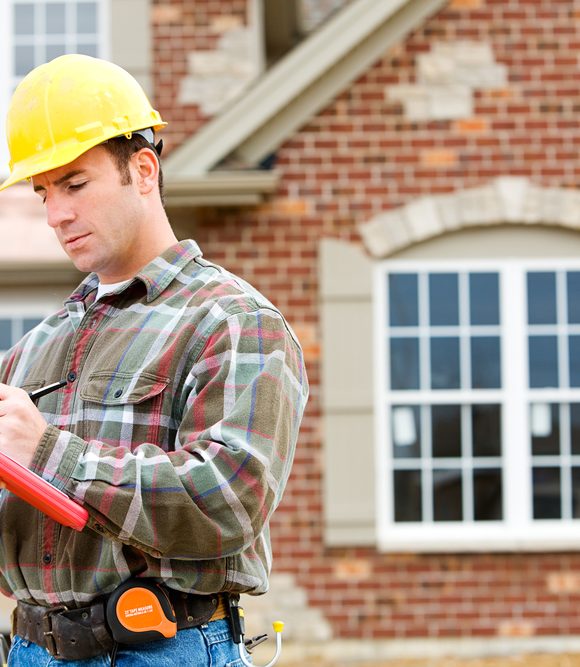Shopping for a new home? Start by shopping for a professional builder first. Whether you are buying a townhouse, a detached home in a subdivision, or a custom-built house, the construction quality of your new home will be determined by the quality of your builder.
Start your builder-search process by calling your local home builders association. They can give you the names of reputable builders in your area. Ask friends and relatives about builders they have dealt with directly or ask them for the names of acquaintances who have recently built a new home.
The Interview Process
Once you have developed a list of builders who are building the type and price range of home you are interested in, research their reputations and the quality of their work. The best way is to visit homes that they have built and talk to the owners. Ask the builders on your list for the addresses of their recently completed houses, subdivisions, or townhouse communities. At the very least, drive by and see if the homes are visually appealing.
Look at homes that are the same style as you plan to buy. A good time to visit is on a weekend morning when people are outside doing chores. Introduce yourself and explain that you are considering buying a home from the same builder who built their home.
Ask about their satisfaction with the home and whether the builder delivered what was promised in a timely manner. Ask if they would buy another home from this builder. People will generally tell you if they are happy with their purchase.
Be Thorough
When selecting a builder, be thorough and ask a lot of questions. Get as many specifics as possible. If you receive the answers verbally, take notes. Never hesitate to ask a question because you are afraid of sounding “stupid” or uninformed. What seems like a “stupid” question may yield a very important answer. Buying a new home is probably the biggest and most important purchase you will make in your lifetime. By doing your new “home” work to select a builder, you will instill in yourself and your family a sense of confidence and knowledge that you have made the right choice.
If you have additional questions about selecting a builder, contact your area’s Builders Association. Ask for a builder list that identifies the price categories and subdivisions in which they build. Be sure to tour the Parade of Homes in the Fall and Spring. It is an excellent way to get familiar with the housing market in this area as well as individual builder’s products.
Service After the Sale and Home Warranty
While you are shopping, ask about the builder’s service after the sale. Most builders offer some form of warranty. Many builders back their own warranties on workmanship and materials, typically for one year. Other builders offer warranties backed by an insurance program. One of the most important criteria for selecting a builder is the warranty protection provided on the home. Ask for a copy of the builder’s warranty. Read the document thoroughly and be sure you understand what protection is provided. If you have any questions about the coverage, talk to the builder prior to finalizing your purchase.
Quality and Value
When examining a home, look at the quality of the construction features: the cabinetry, carpeting, trim work, and paint.
In viewing a home, you must determine whether it lends itself to the type of lifestyle you want to lead. Look at the amount of interior living space and how efficiently the space is used. Find out if the builder is incorporating state-of-the-art energy efficiency features, both in appliances and insulation.
Who’s Who in Building
Architect
Building design professional who has completed all required university training in architecture and passed state licensing exams; initials A.I.A. and F.A.I.A. indicate membership in a professional organization, but not licensed status.
Builder or General Contractor
The buck stops with him or her in construction projects. The general contractor secures bids for all work and materials; hires, coordinates and oversees subcontractors; files for permits and arranges for inspections; and generally, makes the final decisions in all construction-related matters.
Building Inspector
One or more local officials who oversee and regulate every phase of residential construction. Regulations vary widely. In most states area home construction meets standards contained in the Uniform Building Code. In addition, applicable provisions of the Uniform Fire & Plumbing/Mechanical & Electrical codes are enforced. Typically, permits are issued, and inspections are made at key stages of construction by County and City building code enforcement departments.
Building Designer
Generally unlicensed professionals (license not required for practice) who, by experience, are competent to design homes, prepare drawings and write specifications; they often work in association with licensed architects.
Construction Manager/Foreman
The general contractor’s right-hand man. A construction manager can be on site when the general contractor is not.
Design/Build Firms
An organization that provides both architectural planning and general contracting services and offers a different approach to the conventional arrangement in which the designer and builder are separate entities.
Interior Designer
Specialist in decoration and furnishing; special training and licensing not required. Initials A.S.I.D. following individual’s name indicate membership in a professional association, for which training and passing tests are required.
Kitchen /Bath Designer
Specialist in designing these rooms; initials C.K.D. and C.B.D. indicate certification by a professional association, for which training and passing tests are required. License is not required for practice.
Landscape Architect
Specialist in landscape and garden planning; primary concerns include site selection, grading, access, drainage and protection of existing plant material. License required for practice.
Subcontractor
A specialist who undertakes responsibility for one phase or trade within the project and reports to the general contractor. In a typical home building project, subcontractors generally include: an excavation contractor who digs foundations and grades the site; a masonry contractor who handles all concrete, block, brickwork and paving; a framing contractor who constructs the shell and interior partitions; a roofing contractor; a heating, ventilation and air-conditioning (HVAC) contractor; a plumbing contractor; an electrical contractor; drywall installers; insulation contractors; finish carpenters who generally handle wood flooring, trim work, and cabinet installation; and a painting contractor.
Surveyor
A professional with the training and equipment to establish or verify property lines. The surveyor also plots and marks the topography of the site, which is crucial in preparing the site plan. He or she may also be employed to stake out the building site, setting reference marks for foundation excavation, establishing grades for roads or driveways and marking the locations for a septic system and water well, if necessary.
Title Insurance Company
The entity that conducts a comprehensive search of the public records to make sure that the title received by a buyer of a new home is “free and clear of any liens and encumbrances”. This assures the issuance of a clear or “merchant able” title in favor of the buyer of a new home at the closing of the sale of the property.
Selecting a Contractor
Every year hundreds of families are taken advantage of by disreputable individuals or companies who represent themselves to be reliable, reputable contractors. If you are planning to hire someone to repair or make improvements to your property there are safeguards you can take to assure the best selection of a contractor for you.
Consider the Following
- Hire only licensed contractors. Contractors are required to be licensed to do certain types of work. When selecting a contractor, you should make sure the contractor holds a current, valid license either issued by your city.
- All contractors do not possess the same expertise. Ask for references and check those references to assure yourself that the contractor is qualified to do the type of work you are wanting done.
- Check business references. Ask the contractor for a list of business references that you can call and verify that the relationships with suppliers and subcontractors are good ones and that the contractor pays his bills.
- Call the Better Business Bureau to find out if there are any complaints or charges pending against the contractor.
- Call local trade associations for information about selecting a contractor.
- Ask for proof from the contractor that he has general liability insurance and workers compensation insurance to protect you, as the property owner, against any claim in the event the contractor, his employees, or someone else is injured as a result of work being done on your property.
- Make sure the contractor you are contracting with will be personally involved in coordinating the work to be done on your property.
- Make sure all required permits are secured and inspections are made. The contractor should be expected to secure all necessary permits. Beware of contractors who want you to secure the permit as the property owner. It is permissible to do so, but it is very unusual that a reputable contractor will ask you to do this.
- Make sure you have a written contract with the contractor that details:
- A full description of all work to be done.
- A firm date of completion
- Total cost of the job.
- Contractor’s license number.
- All warranty information.
- Quality of materials to be used.
- How and on what basis payments are to be made.
- How changes and payment for changes will be handled.
- Make sure complete architectural drawings are done and agreed upon if you are having a room addition added, or extensive remodeling done. Be certain that detailed material specifications are also provided and made a part of the contract you sign.
- Monitor the work being done in accordance with the contractual agreement with the contractor. If you have questions about what is being done or problems with the contractor, either ask questions or confront the problem head on when it occurs in order to minimize any conflict and reach a satisfactory resolve as quickly as possible.
- Final payment should not be made until you are satisfied that the job has been completed in accordance with the terms of the contractual agrement between you and the contractor.




